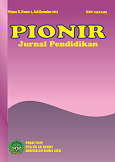ANALYSIS OF THE ACTUALIZATION OF KI HAJAR DEWANTARA'S TEACHINGS TO FOSTER STUDENTS' WRITING SKILLS IN THE SCHOOL LITERACY MOVEMENT PROGRAM
DOI:
https://doi.org/10.22373/pjp.v13i1.21134Keywords:
literasi, ajaran Ki Hajar Dewantara, GLSAbstract
Abstract
Indonesia's literacy level is still low based on the results of the 2018 PISA survey, prompting the government to create a School Literacy Movement program. Understanding the values of Ki Hajar Dewantara's teachings is also not yet fully understood. This research aims to describe and provide meaning behind the phenomena seen in the implementation of Ki Hajar Dewantara's teachings in the GLS program in elementary schools. This research uses qualitative research, this research systematically describes the facts found in the field. The data collection techniques used in this research are interview and observation techniques. Ki Hajar Dewantara's noble values played an important role in the implementation of the GLS program. Ki Hajar Dewantara's views on the trilogy of education centers and the leadership trilogy for implementing the GLS program. The existence of the GLS program for children was developed to be independent in their work and improve children's ability to think critically about things. This is in accordance with the concept of literacy, namely growing children to develop reading, writing, speaking, calculating and problem solving skills at a certain level of expertise in everyday life.
Keywords: Literacy, Teachings of Ki Hajar Dewantara, GLS
References
Dwi Astuti, K., & Arif, M. (2021). Kontekstualisasi Nilai-Nilai Pendidikan Ki Hajar Dewantara Di Era Covid 19. Jurnal Pendidikan Dasar Flobamorata , 2(2), 202-207. https://doi.org/10.51494/jpdf.v2i2.345
Istiqomah. (2017). Penerapan Ajaran Tamansiswa Untuk Menumbuhkan Kecintaan Anak Terhadap Matematika Sejak Dini. Jurnal Penelitian LPPM IKP PGRI Madiun Vol 5, No 1 2017. http://e-journal.unipma.ac.id/index.php/JP-LPPM/article/view/943/842
Kemendikbud. (2016). Peraturan Menteri Pendidikan dan Kebudayaan Republik Indonesia Nomor 23 Tahun 2016, Indonesia. doi.org/10.1016/j.athoracsur.2009.09.030
Kemendikbud. (2018) Evaluasi Program Literasi: Gerakan Literasi Sekolah, repositori.kemdikbud.go.id/15737/1/document
Supriyoko, Ki. 2010. Taman Siswa dan Konsepnya. https://ideguru.wordpress.com/2010/02/19/taman-siswa-dan-konsepnya/. Diakses tanggal 4 desember 2023. Page 1.
Palupi, W. K. S., & Sari, E. Y. (2023). Nilai Karakter Disiplin Dan Mandiri Siswa Kelas 3 Melalui Gerakan Literasi Sekolah, Jurnal Pendidikan Guru Vol. 4, No. 1, Januari 2023, hlm. 024-037. https://doi.org/10.32832/jpg.v4i1.8158
Sumargono, Y. (2015). Pelaksanaan Pembelajaran Among Untuk Pendidikan Budi Pekerti Luhur Di Sekolah Dasar. Jurnal Pendidikan Dasar Nusantara, 1(1). Retrieved from https://ojs.unpkediri.ac.id/index.php/pgsd/article/view/153
Wiryanto & Anggraini G. O. (2022). Analisis Pendidikan Humanistik Ki Hajar Dewantara dalam Konsep Kurikulum Merdekan Belajar. Jurnal Penelitian Ilmu Pendidikan Vol 15 No 1 2022. https://doi.org/10.21831/jpipfip.v15i1.41549
Yusuf, F.B & Wibowo, S. E. (2023). Literature Review:Implementasi Gerakan Literasi Sekolah (GLS) Sebagai Penguatan Karakter. Jurnal riset dan Pendidikan Refleksi Vol 1, No 2 (2023) http://doi.org/10.25273/refleksi.v1i2.1504
Downloads
Published
Issue
Section
License
- Authors retain copyright and grant the journal right of first publication with the work simultaneously licensed under a Creative Commons Attribution License that allows others to share the work with an acknowledgment of the work's authorship and initial publication in this journal.
- Authors are able to enter into separate, additional contractual arrangements for the non-exclusive distribution of the journal's published version of the work (e.g., post it to an institutional repository or publish it in a book), with an acknowledgment of its initial publication in this journal.
- Authors are permitted and encouraged to post their work online (e.g., in institutional repositories or on their website) prior to and during the submission process, as it can lead to productive exchanges, as well as earlier and greater citation of published work (See The Effect of Open Access).

